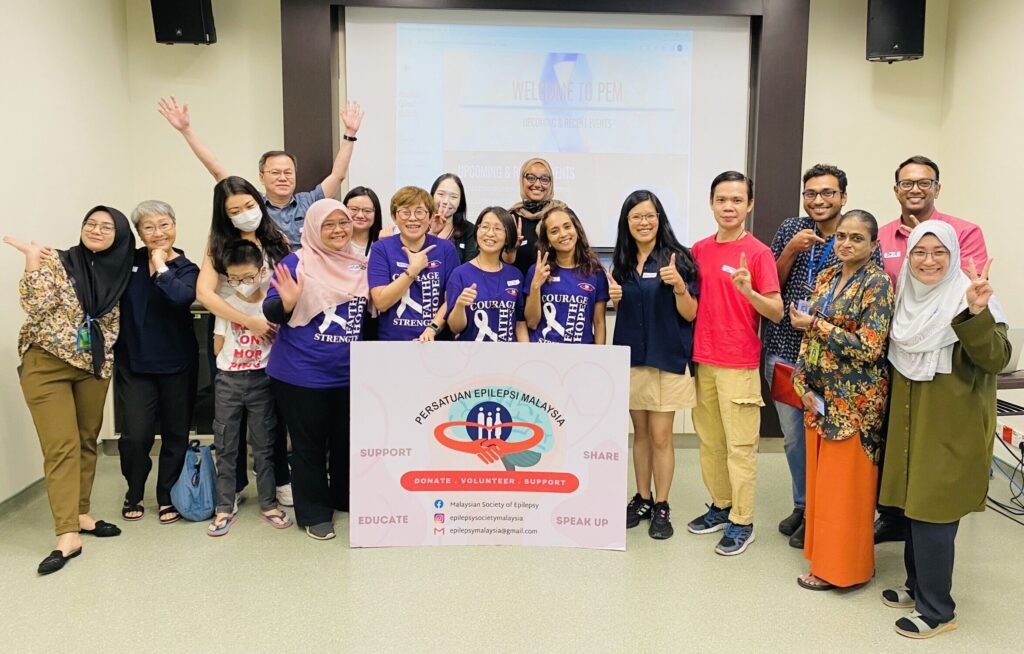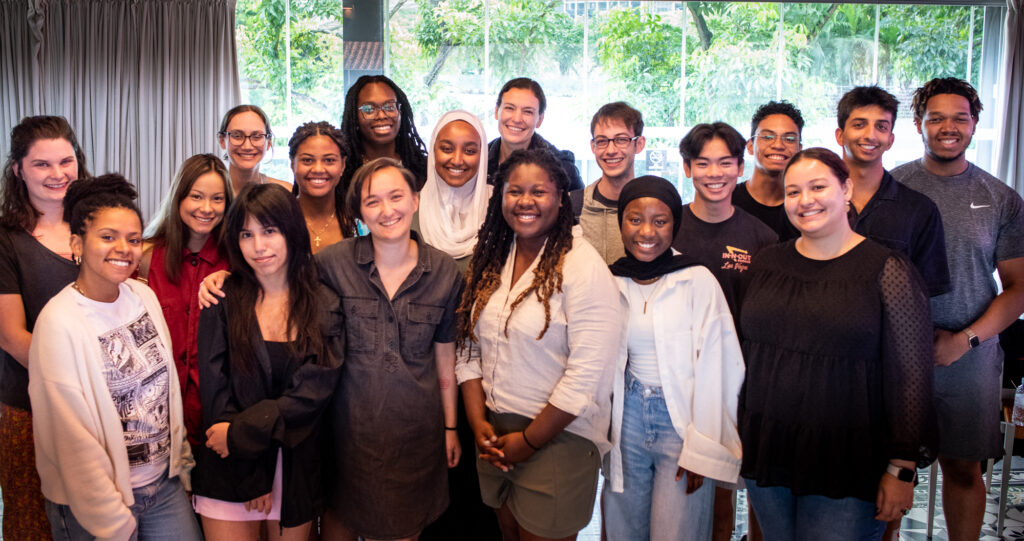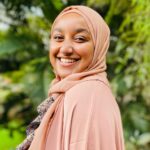
The Luce Scholars Program is a nationally competitive fellowship program established by the Henry Luce Foundation in 1974 to enhance the understanding of Asia among potential leaders in American society. The program provides stipends, language training, and individualized professional placement in Asia for 15–18 Luce Scholars each year and welcomes applications from college seniors, graduate students, and young professionals in various fields who have had limited exposure to Asia. Candidates must be U.S. citizens up to age 30 and be nominated by one of 75 participating colleges and universities.
We spoke with Layan Ibrahim, a first-generation Ethiopian American who is currently serving as a Luce Scholar in Malaysia, where she is conducting epilepsy research at Hospital Canselor Tuanku Muhriz UKM in Kuala Lumpur. In this conversation, Layan shares her diverse personal and academic background, her experience as a Luce Scholar, and tips for prospective applicants to the Luce Scholars Program.
Tell us about your background. What inspired you to study neuroscience and biology in undergrad and pursue a Master of Public Health?
I am a first-generation Ethiopian-American who has lived in the U.S., Ethiopia, Kenya, and now Malaysia. Living in East Africa for 10 years before attending my undergraduate studies inspired me to pursue a career in healthcare due to witnessing healthcare disparities in various forms. Although I knew I wanted to become a doctor, I was unsure of the path I “needed” or was “required” to take to achieve my goal, as neither of my parents is a physician. Therefore, during my undergraduate studies at Emory University, I decided to major in Neuroscience and Behavioral Biology (NBB). Due to the interdisciplinary nature of the major, I was able to take classes in the neuroscience, psychology, biology, and anthropology departments. While majoring in NBB, I knew I wanted to engage in neuroscience research to apply the foundations and principles I learned in the classroom to a real-life setting.
Beginning in my sophomore year at Emory, I started working as an undergraduate research assistant in the Department of Neurosurgery. I was engaged in epilepsy research, studying brain pathways of seizures in monkey models with epilepsy. Although I enjoyed my research, I realized that I was more interested in the social impacts of epilepsy than the neurobiological mechanisms. Therefore, after completing my Bachelor of Science (BS) in NBB, I pursued my Master of Public Health (MPH) on the Global Health track at Vanderbilt University School of Medicine.
During my MPH program, I took classes and learned about global health and public health research fundamentals. Furthermore, I was able to continue my study in epilepsy by completing my master’s thesis focused on evaluating epilepsy knowledge and trust in providers among children enrolled in the Bridging the Childhood Epilepsy Treatment Gap in Africa (BRIDGE) study in Northern Nigeria. After graduating with my MPH, I knew I wanted to continue conducting epilepsy research in an international setting—which initially drew me to apply to the Luce Scholars Program.
What made you want to apply to be a Luce Scholar?
I wanted to apply for the Luce Scholars program because I was searching for an opportunity to apply the knowledge and skills I have developed from my experiences in undergrad and grad school in a global setting. The Luce Scholars program, in particular, allowed me to have dedicated time tailored to pursuing my interest in epilepsy research and global healthcare. Additionally, I was drawn to apply to the Luce program because of the language component incorporated during the program—both during the first two months of the program and afterward, if I wanted to continue throughout the year.
I knew that I wanted to pursue an opportunity where I would explore an area of the world I am not too familiar with, which is initially what drew me to the continent of Asia. Having lived and conducted research in the U.S., Africa, and the Caribbean, I wanted to be able to live and do research in a low- or middle-income country (LMIC) in Asia. In particular, I am interested in the social impacts of epilepsy and other neurological disorders in general, and I am curious as to how religion and cultural practices may play a role in the treatment and/or perception of these neurological disorders. While working on my master’s thesis and reading some of the qualitative interviews done with members of the community, I realized that children with epilepsy and their families had varying perceptions of epilepsy, which was sometimes associated with their religious background, so I wanted to explore this further during my Luce year. I was mainly interested in living in either Malaysia or Indonesia since both are Muslim-majority countries. I wanted to study the role Islam or other religious beliefs may play in perception and treatment.
Beyond my research interests, I really wanted to have a year dedicated to exploring and pursuing things I wanted to do—whether travel, learning a new language, or engaging in a new culture. The Luce Scholars program has provided me the opportunity to do so, giving me the freedom to make my year what I envision.

Can you share details about your application? How did you pick, or were matched with, your host country?
When submitting my application, beyond the standard application questions, there was a section to upload my personal statement, answer a few short answer questions, and submit a short video describing a place or thing that is significant to me. I remember that when crafting my personal statement and short answer responses, I chose to focus on a few experiences that have directly impacted my life and future goals and made it into a cohesive story to show the application readers why I am qualified and prepared to spend a year in Asia, and what I envision that looking like.
After submitting my application, I was invited to participate in the semi-finalist interviews, where I had virtual interviews with two previous Luce scholar alumni. After my semi-finalist interviews, I advanced to the finalist round, in San Diego over a weekend, where I met the other Luce Scholar finalists, engaged in leadership and personal development sessions, and had two panel interviews. Attending the finalist interviews really solidified my desire to pursue the Luce Scholars Program after graduating with my MPH because I got the opportunity to have a more in-depth look at what a Luce year could look like while speaking to other Luce alumni and hearing some of the stories they shared over the finalist weekend.
After being selected as a Luce Scholar, the other Luce Scholars and I were sent an extensive questionnaire to fill out, which had questions about our country preferences, our interests, and what we were looking to get out of our Luce year. After completing the questionnaire, we met with admins from the Luce Scholars Program and The Asia Foundation to discuss where we hoped to place and what sort of work placements we were looking for. Ultimately, I picked the country I wanted to be placed at and chose my work placement. During the Luce application process and after being selected as a scholar, I knew I wanted to pursue epilepsy research through a social impact lens, investigating the role of factors such as religion, education status, and gender on this condition’s treatment, perception, and burden. Malaysia is a very diverse country with multiple ethnic groups, which attracted me to be a Luce Scholar in Malaysia. Through my research, I was able to identify the Malaysian Epilepsy Society and meet with some of the board members virtually. From there, the current vice president of the Malaysian Epilepsy Society offered me a position to work with him in the adult neurology department of Hospital Canselor Tuanku Muhriz (HCTM) UKM.

How has your time been in Malaysia? Can you share details about your Luce Scholar project?
My time in Malaysia has been great thus far! Before starting my work placement, I took Malay language classes in Penang, Malaysia, for a little over a month. I really enjoyed my classes and living in Penang in general. Since then, I have recently continued taking Malay classes with a private tutor. I have enjoyed improving my mastery of the language and applying the skills I have learned in class to my day-to-day life. During Thanksgiving, I traveled to Bali, Indonesia, with some other Luce Scholars in my cohort. I found I could speak Malay with some locals because of the strong similarity between Bahasa Melayu (Malay) and Bahasa Indonesia.
Regarding my work placement, I have had the freedom to work on and lead my own projects as well as collaborate on ongoing studies. Some of the projects I have been involved in include investigating epilepsy caregiver burden and the relationship between fasting and seizure activity for people living with epilepsy. Additionally, I am working on writing a narrative paper on the experiences of people living with epilepsy in Malaysia. I was surprised to see how open and willing people are to share their experiences and personal stories regarding living with epilepsy. It has been an eye-opening and rewarding experience learning about the challenges and how content people are regardless of their daily struggles—which has made me more and more grateful every day.
Outside of work and my language classes, I have enjoyed exploring Kuala Lumpur’s many malls, eating delicious authentic Malaysian food, and traveling to different cities and islands in Malaysia. Moreover, I have recently taken up a scuba diving course, so I am working towards getting my open water diving certification, which has been extremely fun!

After this opportunity, where do you see yourself going next?
After my Luce year, I hope to continue pursuing international public health research, working with a public health organization, or doing public health work in some capacity before applying to medical school. I am currently applying to different programs for next year, and I’m excited to see where I end up! Ultimately, my goal is to pursue an MD-PhD, with a PhD in the Public Health Sciences (e.g., Epidemiology, Global Health, Clinical and Translational Science), so I will be working on my medical school application in the near future.
Finally, what are some tips you could provide for our readers?
My main tip for those looking to apply to the Luce Scholars Program is to be sure you submit a cohesive application that tells a story detailing your background and significant experiences that have contributed to your career and personal goals. In addition, it is important to emphasize “Why Asia?” and explain how a year in Asia will be significant to your career and overall individual trajectory. It is not necessary to have a concrete plan for your Luce year, but mentioning a few countries or organizations you are interested in working with shows that you have done your research and provides the application readers a better sense of what your Luce year may look like.
If you have any specific questions about the application process, don’t hesitate to reach out to the Luce administration team. If selected to advance to the interview stages (particularly for the finalist interviews), I would suggest speaking to a previous Luce Scholar to learn more about what their Luce year looked like and ask any specific questions you may have about the finalist weekend. Speaking to previous Luce alumni helped calm my nerves before attending the finalist weekend, so I highly suggest doing that! Feel free to contact me if you have any questions about Malaysia, my Luce year thus far, or any questions about the overall application process—I am more than happy to help!
Interested in the Luce Scholars Program or other international fellowships? Create a free ProFellow account to access the database, filled with over 2,700 opportunities and fully funded graduate programs.

© 2024 ProFellow, LLC. All rights reserved.